Polish Heroes
The Spirit of Polonia
Sculpture Exhibit by Tracy H. Sugg
All sculpture portraits are $5,500 for Fired Clay, $8,500 for Bronze with the exception of King Sobieski which is $6,500 for Fired Clay, $9,500 for Bronze.
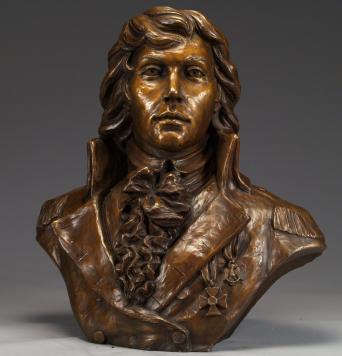
|
TADEUSZ KOSCIUSZKO Poland's Greatest Military Defender & Patriot & Hero of the United States
Shortly before his death in 1817, Kościuszko penned the following advice — the words mirroring his own extraordinary life — to a young Swiss man, Conrad Zeltner, with whose family Kościuszko spent his final years living in exile from his beloved Poland and lonely for his adopted homeland,
the United States: Rising at four o'clock in summer and at six o'clock in winter, your first thought must be directed towards the Supreme Being, worshiping Him for a few minutes. Put yourself at once to work with reflection and intelligence… Be always frank and loyal… and always speak the truth; never be idle, be sober and frugal and even hard on yourself but indulgent toward others. Avoid selfishness and egotism. Before speaking about something and answering, reflect well and reason… in all your actions you must be upright, sincere, and open, no dissimulation in any of your talk, never argue, but seek truth serenely and modestly. Be polite and considerate to everyone, agreeable, and obliging in society, always humane, and succor the poor according to your means. Read instructive books to embellish your mind or better your heart. Never degrade yourself by making bad acquaintances, but be always with persons full of morals and of good reputation; and finally, your conduct must be such that everyone approves of it. Kościuszko's entire life is one of a wholesome role model who forsook all personal comfort and security, forsook the joy of a loving marriage and a family, suffered the ravages of man and nature in the principled military service on behalf of American independence and in the subsequent leadership of Poland's armed forces against his nation's enemies,
and who never complained about his fate — all bespeak the point that the world has been and continues to be blessed for the ages with an American and Polish Hero and Patriot, Altruist, and Champion of Freedom, Independence, Democracy, and Equality. Perhaps Kościuszko's life can best be characterized by an expression used by Poles the world over who fought for
freedoms denied their own countrymen: "za wolność naszą i waszą", "For our Freedom and Yours."
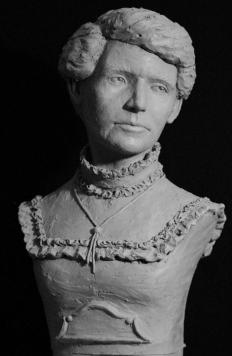
|
MARIE SKŁODOWSKA CURIE
The World's Sole Recipient of Two Nobel Prizes in Two
Separate Scientific Fields
In 1891, at age 24, Marie arrived in Paris from Warsaw, Poland to advance her studies in science at the Sorbonne (University of Paris). There was an established tradition of teaching in her family. Her father had been a professor of physics and mathematics in Warsaw, and her grandfather had been a teacher as well. Paris was the gathering place for Polish émigrés following the Partitions of Poland. The Hôtel Lambert was the seat of dispossessed nobility and other social lights such as Chopin and Mickiewicz, but unappealing to the ordinary Pole who — if interested in news from home — tended to gravitate to the Księgarnia Polska w Paryżu (Polish Bookstore in Paris) located at No. 123, boulevard Saint-Germain, that had been established in 1833 and to which as a newcomer Marie visited on occasion.
In 1893 she earned her degree in physics, was employed in an industrial laboratory, and continued her studies at the Sorbonne, earning a degree in mathematics in 1894. Sometime that year, she met Pierre Curie, an instructor in The Higher School of Physics and Chemistry of the City of Paris. They were mutually attracted to one another, respecting each other's high intelligence and scientific promise, so much so that he sent her a letter on one occasion proposing "to spend life side by side, in the study of our dreams: your patriotic dream; our humanitarian dream and our scientific dream…" Married in 1895, in July of 1898 they announced that they had discovered a new element that they identified as "polonium." Marie had hoped that by using the new scientific word polonium, attention to Poland's continued lack of freedom and independence would be sustained in the scientific community worldwide. In the same year, they announced the discovery of another element that they named "radium." Marie earned her Doctor of Science from the Sorbonne in 1903, the same year she and her husband won the Nobel Prize in Physics, and continued her career in scientific research following the accidental death of Pierre on the streets of Paris in 1906. Her discoveries advanced nuclear physics and cancer therapy. In 1911 she was awarded her second Nobel Prize, this time for Chemistry.
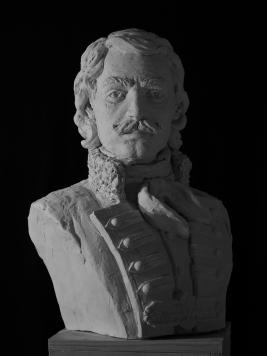
|
KAZIMIERZ PULASKI
Defender of Poland & Father of the United States Cavalry
From 1768 to 1772, Patriotic Poles led by Count Józef Pułaski and his three sons — Franciszek, Kazimierz, and Antoni — formed the Confederacy of Bar in an effort to rid Poland of growing Russian interference in Poland's governmental and military affairs. They viewed Poland's king as the puppet of the Russian Empress, for the King and Empress had been lovers. For four years the Confederacy struggled against Russian forces that overwhelmed their own, and it was then that young Kazimierz Pułaski displayed his acute
skills as a military commander in combat. Coming to America, Pułaski saw his first action at the Battle of Brandywine in 1777, where his brazen cavalry charge famously saved George Washington's life. Wounded by grapeshot two years later, he died of his wounds and was mourned throughout the fledgling nation, having proved in action his words to the Continental Congress: "Know that as I could not stoop before the sovereigns of Europe, so I came to hazard all for the freedom of America, and desirous of passing the rest of my life in a country truly free, before settling as a citizen, I came to fight." Kazimierz Pułaski was a soldier's soldier, admired by subordinates, those lowly-placed as well as those highly-placed, one of whom had been "Light Horse Harry" Lee — the future father of Robert E. Lee — who wrote of Pułaski: "He was sober, diligent, and intrepid, gentlemanly in manner and amiable in heart. He was very reserved, and, when alone, betrayed strong evidence of deep melancholy. Those who knew him ultimately spoke highly of the sublimity of his virtue and the constancy of his friendship… this brave Pole encountered difficulty and sought danger." A soldier's soldier indeed. In death Pulaski embodied the ideals depicted in the lyrics of a song sung by the Confederates in battle against Russia years earlier in his life: On God's order I must enter the field, forego my career for a place in heaven. Such is my wager: my faith is my shield, I die for freedom. I know that my marching will never cease, the
Cross is my armor, salvation my spoils. If I fall in battle my soul seeks peace, for my country. Blood was spilled from His wounds to save me too, it confirms my desire, soothes my yearning, As a Catholic my heart is pierced through, loyal to my faith.
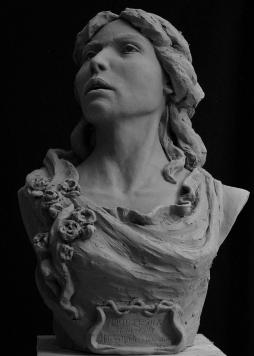
|
HELENA MODRZEJEWSKA
Polish Exile & America's Pioneering & Leading Stage Actress
Known best for her stage portrayal of Shakespeare's heroines, Helena Modjeska (as she was known in America) typified the difficulty of the Polish experience under an occupied country hostile to Poland's national identity.
After a performance in Warsaw, a number of students presented Modjeska with a bouquet of roses tied with red and white ribbons, the national colors of Poland. The students were accused of fomenting political unrest and were summarily expelled from school, and barred from any other education. Distraught, one of the children committed suicide. After emigration to California and having the American public greatly receive her performances, Modjeska was featured at a conference for women at the World's Fair in Chicago. Speaking to her audience there, Modjeska detailed the struggles of living under the oppression of an occupational government. Her remarks were reported to the government in Russia, and she was banned from returning to Poland. During the later years of her life, she gave performances
strictly for charitable causes, staying primarily near her home in California. Upon her death at the age of 68, her remains were returned to Poland to be buried in Krakow. In death, she defied the rule of Tsarist law and returned to her homeland.
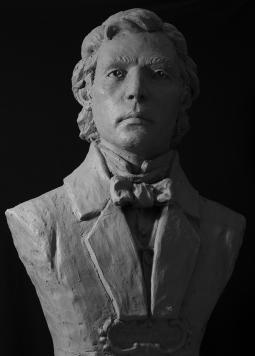
|
FRYDERYK CHOPIN
Poet of The Piano, Composer & Universal Artistic
Promulgator of Polskość
Arthur Rubinstein once noted:
Chopin was a genius of universal appeal. His music conquers the most diverse audience. When the first notes of Chopin sound through the concert hall there is a happy sigh of recognition. All over the world men and women know his music. They love it. They are moved by it. Yet it is not 'Romantic music' in the Byronic sense. It is expressive and personal, but still a pure art. Even in this abstract atomic age, where emotion is not fashionable, Chopin endures. His music is the universal language of human communication. When I play Chopin I know that I speak directly to the hearts of people. Chopin had lived most of his short life in varying degrees of poor to frail health to which he eventually succumbed in the form of pulmonary tuberculosis. In spite of his health, his works were characteristic of an exceptionally — indeed, preternaturally superior — impressive musical instinct, an acute imagination and strong hands whose fingers had mastered the keyboard. For Polish émigrés living in Paris during Chopin's lifetime, the Hôtel Lambert had been their mecca for political discussion, music, art, poetry, literature and drama. It was there that Chopin met Adam Mickiewicz who was considered to be Poland's primus inter pares poet in company with Juliusz Słowacki and Zygmunt Krasiński. In the winter of 1848-1849, when Chopin was in the final months of his life, he visited Adam Mickiewicz who had himself been experiencing a period of poor health, and to lift the spirits of his ailing friend and fellow Pole, Chopin provided him with a private piano concert of his works. Despite the fact that Chopin's works have universal appeal throughout the world, a considerable and conspicuous number of them address the Polish psyche in non-musical activities as attested to by Zdzisław Jachimecki in 1937: "Chopin at every step demonstrated his Polish spirit, in the hundreds of letters he wrote in Polish, in his attitude to Paris's (Polish) émigrés, in his negative view of all that bore the official stamp of the Powers that occupied Poland."
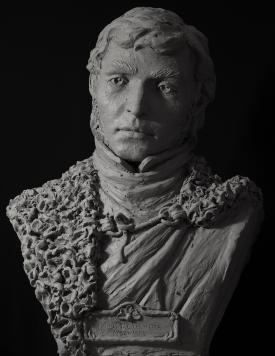
|
ADAM MICKIEWICZ
Poland's Greatest 19th Century Poet & Uncompromising Loyal Patriot
Unchallenged as the greatest poet of the Slavic peoples, Adam Mickiewicz distilled the essence of Polish patriotism and yearning for the country's restoration to a bittersweet nectar. Singlehandedly, he defined a strong, passionate people who would not rest until their homeland was freed,
and it is his inspiration which led many to rebel against their oppressors through the years. Exiled from Poland himself, he managed to publish thinly-veiled calls to freedom that somehow made it past the Tsarist censors to call his people to freedom. His seminal work, Pan Tadeusz, has been regarded by some as the only successful epic since the time of Homer.
Kyrie Leison.
Chryste Leison.
God our Father, who led Your people from Egyptian captivity, and led them to the Holy Land, Return us to our fatherland. His Son, our Redeemer, who,
tortured and crucified,resurrected and reigns in glory, Arouse our fatherland from its grief. Mother of God, whom our fathers called the Queen of Poland
and Lithuania, Save Poland and Lithuania…
From Muscovite, Austrian, and Prussian bondage,
Deliver us O Lord…
Through the blood of all soldiers killed in battle for
Faith and Freedom.
Deliver us, O Lord!
Through the wounds, tears, and suffering of all Polish prisoners, exiles, and pilgrims.
Deliver us, O Lord.
For a universal war for the freedom of peoples. We beseech Thee, O Lord.
For arms and ensigns bearing the national eagle. We beseech Thee, O Lord.
For a happy death on the battlefield. We beseech Thee, O Lord.
For a grave for our bones in our own land. We beseech Thee, O Lord.
For the independence , unity, and freedom of our
fatherland. We beseech Thee, O Lord.
In the name of the Father, and the Son and the Holy
Spirit. Amen.
Taken from his Litanja Pielgrzymska (Pilgrims Litany), which is an integral component of his monumental Księgi Narodu Polskiego i Pielgrzymstwa Polskiego (Books of the Polish Nation and Polish Pilgrimage).
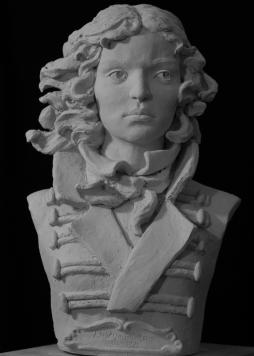
|
EMILIJA PLATER
Military Heroine of Poland & Lithuania
Countess Emilija Plater, born to privilege and nobility, was raised on the stories of Joan of Arc and Tadeusz Kościuszko and the poems of Adam Mickiewicz. No doubt inspired by Kosciuszko, she cultivated an interest in and relationship with the peasantry, learning their ways and their songs. She
also developed an affinity for both horseback riding and marksmanship. This unusual and somewhat mold-breaking upbringing evinced itself in the events surrounding the November Uprising, in which Plater organized a volunteer
military force of infantry and cavalry. Leading her small army, she took a local town and joined forces with General Chłapowski, who ordered her to return home and leave the fighting to the men. True to form, Plater refused, stating that she would not remove her uniform until Poland was a free nation. Her refusal was accepted, and she was granted command of the Polish 1st Lithuanian Infantry Regiment. Her subsequent valor at arms earned her a promotion. After the army's stunning defeat at the hands of the Russians,
General Chłapowski ordered Plater to retreat. Again, she disobeyed orders, intending to break through the enemy lines and continue the fight. Unfortunately, the cold weather, fatigue, and sickness had taken their toll on her, and after writing farewell letters to family, she succumbed to illness
two days before Christmas in 1831. An instant heroine for expatriate Poles around the globe, Plater was immortalized by Adam Mickiewicz in his 1832 poem, Śmierć Pułkownika (Death of a Colonel):
Before yon hut, with measured pace, the sentry
marches to and fro; Crowds throng the door, and
every face is pale with terror and with woe.
What hero, honored and renowned, within, upon
his death-bed lies? Hark! A clear voice with trumpet
sound, comes mingling with the mourner's cries…
Peasants crowd round the warrior dead, He clasps
the cross as when he died; upon his saddle rests his
head, His sword and fire-arms by his side.
But whence this virgin cheek, they said, And bosom
femininely fair? Now save us Heaven! It is a maid!
Emilija Plater slumbers there!
Anonymous translation
Harper's New Monthly Magazine 10 January 1855, p. 279
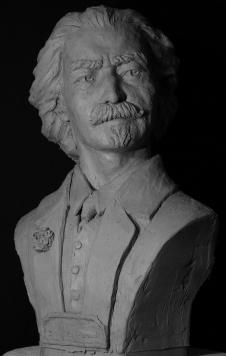
|
IGNACY JAN PADEREWSKI
Piano Virtuoso. Composer, Philanthropist, Politician & Statesman
Throughout his life, Paderewski sustained an abiding concern for the liberation and independence of Poland in the family of European nations. His destiny was shaped by the unforgettable childhood image of Cossacks taking custody of his father who allegedly had been a member of a clandestine Polish organization which sought to free Poland from Russian control and oppression. Paderewski's public life began with an immediately successful
concert hall debut in Paris in 1888. In 1889 during his second concert tour in Europe he was welcomed as the "Lion of Paris." By 1891 he had become popular in London where he played to a full house at the Royal Albert Hall during which time Queen Victoria stated that his music had been "divine." On November 17, 1891 he made his American debut in Carnegie Hall after which he proceeded to present a staggering 109 performances in 130 days. During World War I, he had been instrumental in creating — in concert with Henryk Sienkiewicz — the General Committee for Aid to Polish Victims of the War because most of the action on the Eastern Front occurred in former Polish lands. On February 22, 1916 he gave a recital and delivered a speech in the White House for President Woodrow Wilson after which he also was asked to brief the President in writing on Poland's possible restoration as an independent nation. This resulted in President Wilson proposing Fourteen Points necessary for ending World War I honorably and equitably for all concerned, of which the next to the last Point concerned Poland: "13. An independent Polish state should be erected which should include the territories inhabited by indisputably Polish populations, which should be assured a free and secure access to the sea, and whose political and economic
independence and territorial integrity should be guaranteed by international covenant."
|
THE KF HEADQUARTERS 15 East 65th Street New York. NY 10065 tel. (212) 734 2130 |
WASHINGTON D.C. CENTER 2025 O Street NW Washington D.C. 20036 tel. (202) 785 2320 |
WARSAW OFFICE ul. Kopernika 11/8 00-359 Warsaw, Poland tel.+48 (22) 621 70 67 www.kfpoland.org
|
